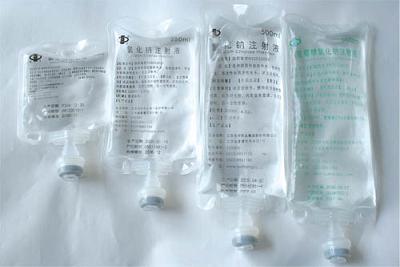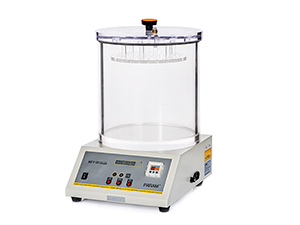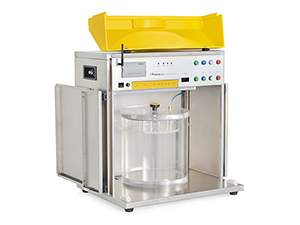Summary
The medicinal infusion bags are typically made of a composite film formed by co-extruding polyolefin and polyamide resin materials. These packaging solutions offer high hygienic safety, no formation of precipitation particles, excellent barrier properties, and resistance to tearing. However, the sealing performance of these bags is one of the most critical factors affecting the quality of the liquid and the maintenance of a sterile environment. This article introduces the use of Labthink Languang's independently developed MFY-01 sealing tester to evaluate the sealing performance of infusion bags. It details the testing principles and procedures, offering valuable insights for pharmaceutical companies and other industries in monitoring the integrity of their packaging systems.
Keywords:
Infusion bags, Pharmaceuticals, Soft plastic packaging, Sealing properties, Seal tester, Leaks, Air bubbles
1. Significance
Medicinal infusion bags can be made from polyvinyl chloride (PVC) or non-PVC composite films. Most modern infusion bags use a three- or five-layer co-extruded composite film made from materials such as polypropylene (PP), polyethylene (PE), polyamide (PA), and various elastic materials like SEBS. These materials are considered among the safest for infusion packaging, as they do not contain any plasticizers and have no reaction or adsorption with the liquid medicine. They eliminate issues such as alkali precipitation found in glass bottles and offer good low-temperature resistance and high-quality performance.
Good quality infusion bags should not easily break, have strong gas and water barriers, and prevent the internal solution from deteriorating or leaking. This ensures that the contents remain protected within a strict aseptic environment. However, the sealing process relies on heat sealing, and improper parameters during this process can lead to either insufficient sealing or excessive heat application. For instance, if the temperature is too high, it may cause the seal to crack or allow gas leakage. Similarly, an uneven surface on the heat sealer might result in wrinkles that create unsealed points. Poor sealing can allow moisture, oxygen, and bacteria to enter the bag, leading to drug degradation or even leakage during transport or use. This article presents a professional sealing performance tester to help manufacturers ensure the integrity of their infusion bag packaging.

Figure 1: Medicinal infusion bag packaging
2. Standards
Currently, the main reference for testing the sealing performance of flexible packaging is GB/T 15171-1994, "Test Method for Sealing Performance of Flexible Packages," which applies to sealed flexible packages made from various materials.
3. Test Sample
A brand of sodium chloride infusion bag finished packaging was used as the sample for the test.
4. Test Equipment
This article uses the Labthink Languang MFY-01 sealing tester to assess the sealing performance of the infusion bag sample.

Figure 2: MFY-01 Sealing Tester
4.1 Test Principle
The MFY-01 sealing tester evaluates the sealing performance of the sample by observing the pressure difference between the inside and outside of the sample when immersed in water under vacuum conditions. Alternatively, it can apply water without vacuuming and then evacuate the chamber to create a pressure differential, allowing the sample to expand and contract, thereby identifying potential leakage points.
4.2 Application Scope
This equipment is suitable for testing the sealing performance of various closed products, including bags, bottles, tubes, cans, and boxes, made from materials like glass, plastic, and metal. It is also applicable after tests such as drop, pressure, high temperature, or cooking.
4.3 Device Parameters
- Vacuum range: 0 ~ -90 KPa
- Vacuum chamber size options: 270 mm (diameter) × 210 mm (height), 360 mm (diameter) × 585 mm (height), 460 mm (diameter) × 330 mm (height)
- Digital preset vacuum and hold time for accurate testing
- Automatic constant pressure air supply technology ensures consistent vacuum conditions
- Professional software supports automatic backflush unloading and end-of-test functions
5. Test Procedure
(1) Place an appropriate amount of distilled water in a vacuum-sealed can and immerse the infusion bag sample in the water. Ensure the top of the sample is at least 25 mm above the water surface.
(2) Cover the sealing lid to ensure no air leaks around the seal.
(3) Set the required vacuum level and holding time via the computer interface.
(4) Turn on the vacuum pump and start the test.
(5) Observe the vacuuming and pressure-holding process, checking for continuous bubble formation indicating a leak.
(6) If continuous bubbles appear, record the pressure value and location of the leak.
(7) Stop the vacuum pump, release the vacuum, open the lid, remove the sample, wipe off excess water, and check for internal water infiltration if necessary.
(8) Turn off the instrument.
6. Test Results
Five samples were tested, none of which showed leakage at the maximum negative pressure of -90 KPa, indicating good sealing performance and ensuring the sterility of the medication.
7. Conclusion
The sealing performance of medicinal infusion bags is a crucial factor in maintaining the sterility and quality of the drug solution. The MFY-01 sealing tester from Labthink Languang offers high accuracy, ease of use, and reliable results. It helps identify weak points in the packaging and sets quantitative quality limits, improving the overall packaging process. To address the limitations of traditional manual testing, Labthink has developed the i-Process 6200 sealing tester and data processing system, enabling automated testing, real-time data upload, and better traceability and control over product packaging performance.

Figure 3: i-Process 6200 Sealing Tester and Data Processing System
In addition to sealing performance, other important characteristics include heat-seal strength, puncture resistance, water vapor transmission rate, and oxygen permeability. For further information, contact us at 0531-85068566 for expert advice. The more you know, the more you trust! Labthink Languang looks forward to strengthening technical exchanges and cooperation with industry partners.
Wire Shield Brush &Twist Machine
Wire Shield Brush &Twist Machine,Wire Stripping Device,Automatic Wire Machine,Auto Wire Stripping Machine
Kunshan Bolun Automation Equipment Co., Ltd , https://www.bolunmachinery.com